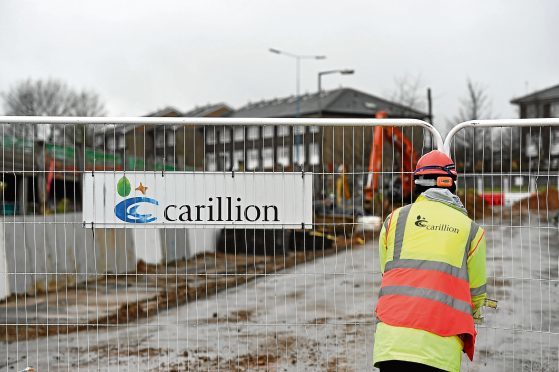The small guy is always the last to know. This seems a pattern of modern business and economics, that insiders have a heads-up on impending disaster while the small operators or the ordinary citizen is out in the cold.
Everyone seems to have known that Carillion was heading for disaster but nobody seems to have warned the employees or small suppliers.
The Scottish Government says it knew last summer that things were looking bad with the giant outsourcing company and “put measures in place” to deal with this. It’s unfortunate it didn’t let the smaller suppliers or apprentices just signing on with the now-bust company know.
Hedge funders have been betting on Carillion’s collapse since 2015, but it seems you need to be a millionaire in Mayfair to get that kind of info, not a cleaner. Banks knew and tried to get the UK Government to cover their losses, while cutting lines of credit to Carillion, and so hastening its death.
Insurers knew and they too tried to get central government to cover them, while also limiting their exposure to the crash.
Anybody in the PFI/PPP/NPD racket (private financing of public services, to you and me) knew because bidding for large construction projects is fraught with danger and Carillion was spread too wide not to be at risk.
The City of London knew, so Carillion shares were raided for value – that is, they were sold in the knowledge that investors were cashing in on a bad bet.
Most of all, the management knew. Every suit who signed up to the high tiers of the company knew what the game was: take bonuses, wage increases and dividends up front, as who knew if there would be any ‘profit’ by the time the deal was done.
They knew this so clearly that senior management negotiated contracts which excused them from the company rule that in the event of failure, bonuses could be clawed back.
So many did this that the board withdrew that rule last summer, knowing it to be effectively useless.
Go to the Carillion Plc website and the pages which are meant to extol the virtues of the bosses are empty – the people, festooned with CBEs and MBEs, are no longer there, hiding in cyberspace’s darkness rather than being held to account.
Everybody but the ordinary person knew, and yet none of these powerful players were able, or inclined, to do anything constructive.
The Government did not insist that the company stopped paying dividends and bonuses to managers.
The City regulators couldn’t impose change, either, nor the Institute of Directors, which was alarmed at the poor governance of Carillion.
It is a pathetic picture of modern capitalism. The raiding of the till before the shop closed, the greed of the management, who then go into hiding.
Worse of all is how the collapse exposes outsourcing as a grubby affair – those in the know taking profits while small companies are left unpaid.
The UK and Scottish governments like outsourcing, and both should be looking to the law books to see where the rules can be changed.
There are two key reforms which should happen. Private company pensions should be run and governed independently from that company.
Carillion pensioners face losing at least 10% of the value of their payouts.
It is scandalous that a pension pot – money earned and owned by the workforce – is in the hands of the management with vested interest in underpaying what’s due.
The second essential reform is that money due to small suppliers should be kept by the Government and paid directly to the supplier. Outsourcing companies would only collect the money to pay directly for their staff and operations, and the profit slice.
That way we wouldn’t have this repeated business of low-paid staff discovering their hard-earned pensions have been cut by the incompetence of the management, and the contagion of a big collapse would not spread to the smaller companies involved.
Theresa May told the Commons yesterday that the Government was just a “customer” of Carillion and had no role to intervene. This is the Prime Minister who took office pledging to clean up capitalism and who stood on a manifesto promise of “fairer corporate governance, built on new rules for takeovers, executive pay and worker representation on company boards”.
The manifesto goes on: “As Theresa May said when she first became Prime Minister, the work of the Government under her leadership will be driven not for the benefit of a privileged few but by the interests of ordinary, working families: people who have a job but do not always have job security…”
Before stating: “We (Conservatives) do not believe in untrammelled free markets. We reject the cult of selfish individualism.”
The Prime Minister and her Government know the problem: they keep promising reform and have yet to deliver. Meanwhile, the fashion for outsourcing must come to an end, a 40-year experiment in making government more efficient has simply become a racket, with you and I always the last to know, but often the first to pay.
See page 29 for more on Carillion
